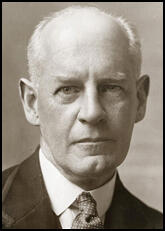John Galsworthy

John Galsworthy, the son of a wealthy solicitor, was born at Kingston Hill in Surrey on 14th August 1867. Educated at Harrow and New College, Oxford, Galsworthy was called to the bar in 1890, but instead decided to become a writer.
Galsworthy's first collection of short-stories, From the Four Winds, was published in 1897. This was followed by the novel, The Island Pharisees (1904). These books sold poorly and Galsworthy later pointed out that for "eleven years, I made not one penny out of what I, but practically no others, counted as my profession."
Galsworthy's first real success was the play The Silver Box (1906). Later that year, his novel, The Man of Property, the first of his celebrated Forsyte Saga series was published.
Galsworthy held progressive views and supported prison reform, votes for women and opposed censorship. His plays Strife (1909) and Justice (1910) dealt with the themes of poverty, class and injustice.
On the outbreak of the First World War Galsworthy was 47 years old. Too old to fight, he worked in France at the Benevole Hospital for disabled soldiers. He also signed over his family house as a rest home for members of the British Army recovering from war injuries.
Galsworthy was also recruited by Charles Masterman, the head of the War Propaganda Bureau (WPB), to write material on behalf of the British government. This included articles in the New York Times, the New York Tribune, Scribner's Magazine and the Literary Digest. Unlike some of those recruited by the WPB, Galsworthy refused to encourage the public to hate the enemy. He instead concentrated on the need to give support to disabled and wounded soldiers. Galsworthy's collected articles for the WPB were published in A Sheaf (1916) and Another Sheaf (1917).
After the war Galsworthy completed the Forsyte Saga with In Chancery (1920) and To Let (1921). The second part of the Forsyte chronicles was made up of The White Monkey (1924), The Silver Spoon (1926) and Swan Song (1928).
Galsworthy was now a highly successful author and he was able to purchase a 15-room mansion at Bury in Sussex. John Galsworthy, who received the Nobel Prize for Literature in 1932, died from a brain tumour on 30th January, 1933.

